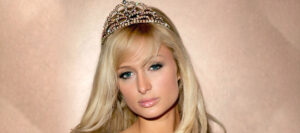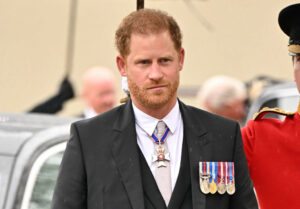Ever since the cancellation of the Sussexes’ Spotify deal, it’s been unclear what they’d pivot to next. A Kardashians-style reality show? A wellness empire, à la Gwyneth Paltrow? A high-profile divorce with all the sordid trimmings (and, for Harry, perhaps a sheepish return to the royal fold)? But this week, the next chapter of the Harry and Meghan saga was finally revealed: the pair has purchased the screen rights to Meet Me at the Lake, the New York Times bestselling romance novel by Carley Fortune, with the intention of turning the story into an original film for Netflix.
In many ways, this is a logical next step for the couple — especially for Meghan, given her pre-marriage Hollywood career. The path from acting to producing is well-trodden in the film industry, and has been a particular boon for mid-career actresses who want to pivot away from being in front of the camera. Mila Kunis, Reese Witherspoon and Margot Robbie have all become powerhouse producers, with a sixth sense for finding under-the-radar content that’s ripe for adaptation.
And yet, within minutes of the announcement dropping, a negative narrative had solidified. Far from an unremarkable or even savvy move in an industry one of them already had strong ties to, this development was presented as just another example of the couple’s desperation to stay relevant (“Harry and Meghan ‘buy film rights’ to romance novel to ‘revive media careers’”) as well as their eternal depthless narcissism (“Six ways the book ‘bought by Harry and Meghan’ mirrors events in their lives”). Us Weekly quoted an “insider” who seemed to confirm the personal connection: “The story really spoke to the Sussexes and has a lot of parallels to their own life. Harry and Meghan both think it’s the perfect choice.”
But even if we take at face value the alleged and much-discussed similarities between this book and their lives (and more on that in a minute), this all seems fine. I am no particular fan of the Meghan and Harry Post-Royal Tour de Victimhood, now in its third year, but the fact remains that they do have a Netflix deal, and they have to do something with it. Channelling their efforts into scripted media, for a platform full of ridiculous but compulsively watchable romantic fare, is as worthy a project as any. Unless you were hoping to see the couple’s relationship with Netflix implode in the same spectacular fashion as their Spotify one, it’s difficult to see the issue here, let alone be outraged by it.
But there’s the rub. Weren’t some people clearly hoping for exactly this? At some point, the public sentiment surrounding the Sussexes curdled from curiosity into contempt, from critiquing their various choices to finding fault with every single one of them. This phenomenon was arguably visible long before their exit from the royal family — as Buzzfeed noted in 2020, the British press had, for years, been chastising Meghan and Harry for the very same behaviours that earned Will and Kate effusive praise. Looking back, it’s hard not to notice how thoroughly Meghan in particular was villainised. Everything she did, from touching her pregnant stomach (“Virtue signaling, as though the rest of us barren harridans deserve to burn alive in our cars”) to eating avocados (“a fruit linked to water shortages, illegal deforestation and all round general environmental devastation”) became evidence of her innately terrible character.
With Megxit, there was her ultra-memeable complaint that “not many people have asked if I’m ok”, and then came the Oprah interview, which was met with nothing short of fury. And while even the couple’s fiercest critics used to concede that whatever else you thought of the Sussexes, they did seem to be really and truly in love, that goodwill has lately vanished amid recent rumours of marital discord; now, every step Meghan takes outside her home without Harry is suspicious.
And when it comes to their latest project, every jab reads like the living embodiment of that joke about how, once you hate someone, even the most innocuous things they do begin to seem obscene and infuriating. (“Look at that bitch eating chicken. Why you eating chicken, bitch?!”)
Obviously, scapegoating people has been a part of the human experience since the dawn of time; obviously, there’s a certain amount of fun to be had in ganging up to hate on someone who has been deemed an acceptable target. But the feeding frenzy surrounding Harry and Meghan’s every move reveals the problem with this: not that it’s cruel (although it is that, too), but that being maximally uncharitable has a way of making you stupid.
Which brings us back to the much-hyped similarities between Meet Me at the Lake and the lives of the couple who want to adapt it, which have been foundational to the media coverage of this project, for better and for worse. Having actually read the book, I regret to say that these alleged parallels are absolute baloney, and that any attempt to make this into an example of Meghan and Harry’s desire to make everything about themselves is utterly contrived. The nadir of this is probably the allegation that one of the eerie commonalities between truth and fiction is, and I am not making this up, that the characters in the book at one point drink martinis together: “The Times previously reported that Harry’s favourite drink is a beer — while Meghan loves a martini or two.” Look at that bitch, drinking a martini. Why you drinking a martini, bitch?!
At this point, it’s hard not to be at least a little sympathetic to Harry’s insistence that he and Meghan have been treated uniquely unfairly by the media, even if the specifics of his complaints tend to err on the side of absurdity. Yes, the couple often behave like a pair of entitled jackasses, but they’re also invariably assigned the role of jackass whether they’re acting like this or not. Of course, it’s easy to understand how a narrative like this becomes so ubiquitous. It’s not even sinister: the people writing these articles have a job to do, and that job is to explain why any of us should devote a single brain cell to the continued, stateside saga of the former Sussexes. And the best way to do that, in a media landscape fuelled by outrage, is to convince people that there’s something bigger happening here than a pair of rich people making a lucrative investment that is basically guaranteed to pay out.
But the truth is that, with the possible exception of its Toronto setting, Meet Me at the Lake has no real parallels to Meghan and Harry’s own meet cute. It’s just a well-written romance that effectively employs all the usual tropes and has inspired an avid fanbase, which pretty much guarantees that any movie based on the story becomes a massive success — any of which would be more than enough reason for a pair of savvy producers to snap it up.
For all these reasons, I expect that Meet Me at the Lake will do well onscreen. It has all the upmarket Hallmark vibes of The Notebook with the sass of a Nineties rom-com: a little sweet, a little spicy, and just enough will-they-or-won’t-they tension to make the ending satisfying. But as for what it says about Meghan and Harry, it’s nothing all that exciting, and it’s something we already knew: they may be a couple of dilettantes when it comes to podcasting or memoir or documentary, but they’ve always had a talent for knowing what a good love story looks like.
Disclaimer
Some of the posts we share are controversial and we do not necessarily agree with them in the whole extend. Sometimes we agree with the content or part of it but we do not agree with the narration or language. Nevertheless we find them somehow interesting, valuable and/or informative or we share them, because we strongly believe in freedom of speech, free press and journalism. We strongly encourage you to have a critical approach to all the content, do your own research and analysis to build your own opinion.
We would be glad to have your feedback.
Source: UnHerd Read the original article here: https://unherd.com/



